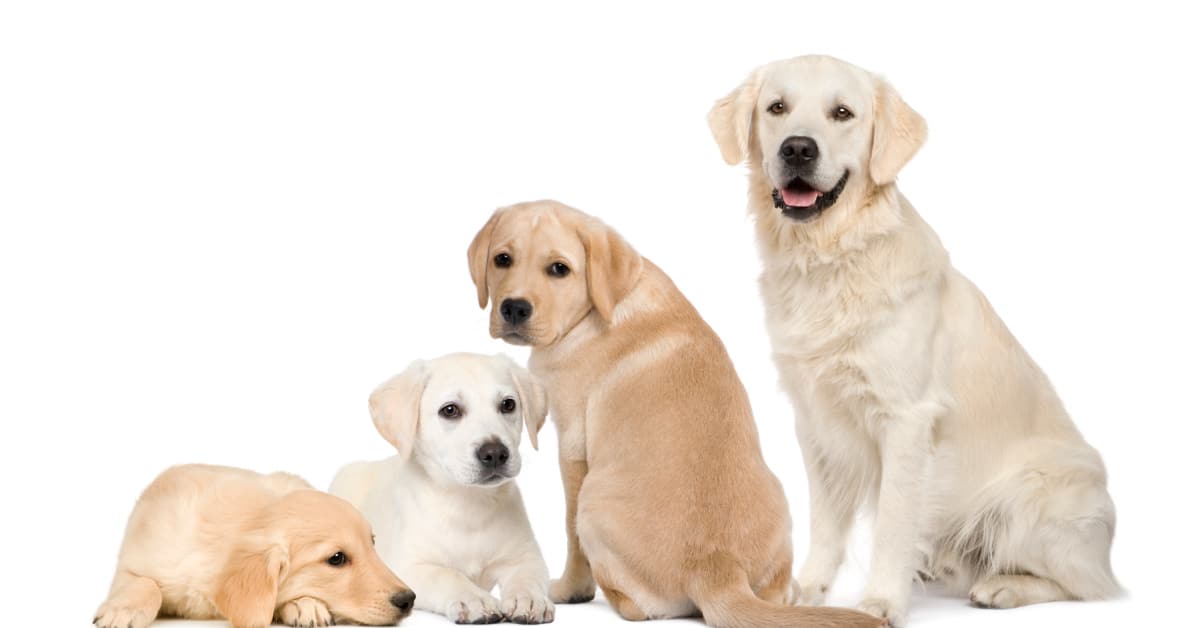Are you wondering what constitutes typical Labrador Retriever behavior by age?
Many pet owners are quick to comment that their Lab usually exhibits some behavior problems that lead them to become impatient with their canine companion.
If you are one of them, this post will give you a quick look at the type of Labrador behavior by age that every pet parent should know about.
Labradors mature slowly
One thing that you should remember when it comes to Labrador Retriever behavior is that big dog breeds like Labrador Retrievers mature more slowly compared to small and medium-sized dogs.
Most Labs will not reach full maturity (for both their bodies and personalities) until they are 18-24 months old. Take note also that each Lab will grow and mature at their own pace.
Labrador Retriever behavior at 0-2 weeks
Your Lab pup is still a newborn at this age, so there’s not much you can expect to know about Labrador Retriever behavior by this age. What you only need to know is that they will spend the majority of their time with their mother as they develop.
Your puppy will also be blind and deaf for the first 2 weeks, so they may not react much if you try to speak to them. They will simply sleep and eat for most of this time.
Labrador Retriever behavior at 2-4 weeks
Your Labrador puppy will finally open their eyes and begin to respond to movement, light, and sound around them.
Similar to the first two weeks, most of their time will be spent sleeping and eating. However, they may start to slowly explore their surroundings out of curiosity.
They will also start crawling around and try to stand (they may stumble often). They will also begin to recognize who their mother and siblings are.
Labrador Retrievers behavior at 3-4 weeks
At this age, your Lab is learning how to become a puppy because their senses are rapidly developing. However, you should avoid surprising their sensitive ears with loud noises.
You may notice that your puppy will be much more curious at this age. They will smell, look, and listen to everything they can.
They may even start to know who you are if they see you frequently because they may wave their tails and yelp!
However, it is important they spend nearly all of their time with their siblings and mother to learn how to be a dog.
Labrador Retriever behavior at 4-7 weeks
At this point, your Labrador puppy has learned the basics of being a puppy and it is time to move onto the next step: socialization.
Your pup will be more interested in playful behavior by playing with their siblings and mother. They will bite their sibling’s ears and simply have fun.
It is also important to socialize with your pup when they are 5-7 weeks old so they will learn how to behave around humans.
Remember not to separate them from their mother at this age. They can get behavior issues (e.g., barking, biting, separation anxiety) and be generally nervous if they leave their mother and siblings too early.
Labrador Retrievers behavior at 8-12 weeks
Many Lab puppies will go through a period of being fearful. While not all puppies will go through this, many puppies will suddenly be fearful of almost everything, even items that they are familiar with.
This is the reason why many people suggest to not scare them, create loud noises, or discipline them harshly.
Labrador Retriever behavior at 3-4 months
You may notice that your sweet Lab puppy is slowly starting to challenge your authority.
At this age, they are similar to juveniles. They will test their boundaries to see what they can get away with, which means they may engage in some naughty behavior.
For instance, your puppy might start barking and crying to get more treats. They may even bite you if they do not get what they want. That is why early discipline with positive reinforcement is crucial at this stage.
Labrador Retrievers behavior at 3-6 months
Your Lab puppy will be a lot more independent now, but they will also be a bit bratty. They will try to be more dominant to see how far they can get. For this reason, you need to establish clear dominance over them so that they will remember that you are the alpha.
Your puppy will also likely engage in destructive behavior. They may be tempted to chew, dig, and tear at this age because of hormonal changes.
Therefore, it would be best to give them enough exercise and toys to avoid that behavior.
Labrador Retriever behavior at 6-18 months

Your pup is no longer the same baby they once were. Your Lab will look much more grown-up and will have somewhat more mature behavior.
However, it is crucial to remember that they are still puppies even if they look like adults.
This means that they will still exhibit some puppy-like behavior like being hyper, curious, and exuberant.
Your Lab will still try to test their boundaries, even if you taught them who is boss.
Even with regular training, they may still engage in somewhat destructive behavior. Therefore, regular and firm disciplinary training is still important.
Labrador Retriever behavior at 18 months-7 years old
Congratulations! Your Labrador has officially gone through puppyhood and adolescence. When they are 18-24 months old, they are officially fully grown!
Once they are almost or are 18-24 months old, you will notice that your Lab is a lot calmer.
They will act more mature and patient, exhibiting the true friendly Labrador personality that they are known for.
They will be much warmer and easy-going. However, you should not quit training that quickly―they can still engage in destructive behavior, especially if they do not get enough exercise or attention.
Labrador Retriever behavior at 7-10 years old
Most big dogs do not live very long lives, so most Labradors will be seniors as early as 7 years old.
Your Labrador Retriever will still act loving and friendly, especially towards other members of the home. However, you will definitely notice that your dog is much slower and acts almost like an “old man”.
They will not want to play as much as they used to—instead, they will prefer to cuddle next to you.
If they see a ball or their leash, they may not jump for joy the same way they would as adults. They may also appear more fearful of loud noises, threats, etc.
To conclude
Dogs are like humans, and Labrador Retriever behavior by age will be different from one canine to another.
While each dog is unique, you can expect them to have very similar behaviors to what is listed above.
You can use it as a guide to know what to expect from your Labrador.







